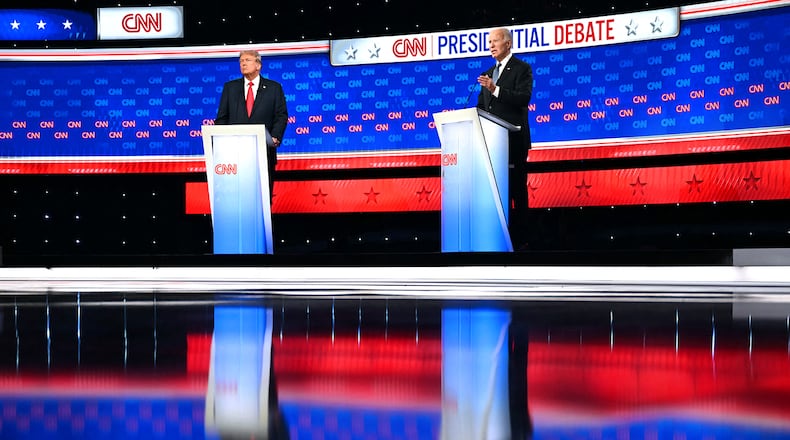President Joe Biden’s biggest challenge going into the first presidential debate of 2024 was combating the widespread belief among voters that he is too old, too feeble and too cognitively impaired to handle another four years in the White House. The Trump campaign has promoted this perception relentlessly for months, including through misleadingly edited videos.
Biden failed to meet this challenge.
Credit: Addison Hill
Credit: Addison Hill
In fact, his performance will serve only to reinforce concerns about his physical stamina and mental acuity. From his shuffling gate walking onto the debate stage to his rambling and somewhat incoherent concluding statement, the president gave the impression of a man who has suffered a considerable decline in his physical and mental capabilities since he debated then-President Donald Trump in the 2020 campaign. Biden seemed hesitant and, at times, confused. His voice was hoarse, and he frequently appeared to be staring into space. Shortly after the debate ended, some of his advisers put out the word that Biden was suffering from a head cold.
It’s not that Trump put in an especially impressive performance. Trump’s the most important challenge was to appear presidential and to address concerns about his emotional stability, honesty and trustworthiness. He also clearly fell short. He attacked the Biden’s family. He refused to clearly state that he would accept the results of the 2024 election if he lost. He refused to take any responsibility for the violent attack by his supporters on the U.S. Capitol on Jan. 6, 2021, continuing to implausibly blame former House Speaker Nancy Pelosi (D-Calif.) for failing to call in the National Guard to stop the attack. He repeatedly claimed that under Biden, millions of migrants had entered the United States from prisons and mental institutions, causing a major crime wave and threatening the solvency of Social Security and Medicare. All of these claims are false.
Trump ignored many of the moderators’ questions, such as how he would deal with the threat of climate change and address the opioid crisis. He claimed, inaccurately, that his preference for turning control of abortion policy back to the individual states had broad support from legal experts and the public. And he ignored the enormous death toll from the coronavirus pandemic because of his hesitation and incompetence in dealing with the greatest public health crisis to face the United States in the past century. Trump constantly exaggerated, bragged and distorted the facts. But he did so forcefully and energetically.
Trump gave Biden plenty of opportunities to attack his record on dealing with the coronavirus, his role in overturning Roe v. Wade and his threats to prosecute his political opponents if he is returned to the White House. With only a few exceptions, however, Biden failed to do so. Biden’s performance was so weak that it has already led to open questioning by Democratic leaders about whether he should be replaced as the party’s presidential nominee.
Joe Biden is hardly the first president to have a subpar debate. First debates have been especially problematic for incumbents. Jimmy Carter in 1980, Ronald Reagan in 1984, George H.W. Bush in 1992, George W. Bush in 2004 and Barack Obama in 2012 all gave disappointing performances against their challengers. Reagan, George W. Bush and Obama nevertheless went on to win reelection after giving stronger performances in later debates. Carter, whose one and only debate in 1980 took place only a week before the election, and George H.W. Bush, lost their reelection bids. In all of these cases, many factors other than debate performance contributed to electoral success or failure.
History demonstrates that it is possible for an incumbent president to recover from a poor debate performance. In theory, Biden has plenty of time to recover from his poor showing on Thursday night. Election Day is more than four months away. A second debate is scheduled for Sept. 10. Like Reagan, George W. Bush and Obama, Biden could bounce back with a stronger performance in that debate. Trump, as Biden reminded us on Thursday night, is a convicted felon. Beyond that, Trump is a deeply flawed and unpopular challenger whose positions on many domestic and foreign policy issues are quite unpopular.
The question that must be asked after Thursday night is whether Biden capable of doing what is necessary to exploit Trump’s glaring weaknesses between now and Election Day. Biden’s debate performance is not just raising concerns about whether he is capable of leading the country for the next four years. It is also raising concerns among many Americans who oppose Trump and fear the consequences of a second Trump presidency about whether Biden possesses the mental acuity and physical stamina to run an effective campaign for the next four months to keep that from happening. The future of American democracy may well hinge on the answer to that question.
Alan I. Abramowitz is the Alben W. Barkley Professor Emeritus of Political Science at Emory University.
About the Author
Keep Reading
The Latest
Featured




